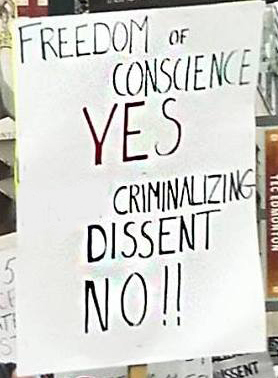Creating a Taboo to Suppress Criticism of Canada's Political InstitutionsThe Standing Committee on Canadian Heritage recently conducted a study into the relationship between Facebook and the federal government. It examined email exchanges between a member of Canadian Heritage Minister's (Steven Guilbault) political staff (Owen Ripley) and Facebook's Canadian Head of Policy (Kevin Chan). The exchange involved a request by the Facebook exec that the Heritage Minister's staff member circulate a posting for a job at Facebook's public policy department. The Heritage Minister's staff member agreed to circulate the posting "to a few people who might be good candidates," and the Facebook exec communicated that Facebook was open to hiring on a temporary basis so that the person could return to working for the government. At the study, this email exchange was said to be improper because the Ministry of Canadian Heritage was in the midst of drafting new broadcasting legislation which would impact Facebook (Bill C-10), the implication being that it didn't look good. In spite of the appearance of impropriety, the Committee learned that it was not in fact improper. The discussion simply affirmed that there is a revolving door through which people move back and forth between the private and public sectors. (Bill C-10 has now passed second reading and is back with the Heritage Committee for study.) In the discussion, however, disconcerting accusations arose that the NDP had raised this matter with the aim of questioning and damaging the integrity and credibility of government institutions, including the civil service. The Heritage Minister offered his opinion "that everybody in this country has a responsibility, a duty, and especially elected officials, to ensure that we protect our institutions." He said, "The last thing we should try to do is to somehow diminish them in the hope that we could score points. There are other ways we can score political points. Of course we're political adversaries -- I understand that -- but certainly not at the expense of our institutions."
One need look no further than the shenanigans of the cartel parties and their governments to see what has brought the democratic institutions, cartel parties, government and House of Commons into disrepute. After refusing to put an end to the first-past-the-post system of counting votes as he had promised he would do in the election that first brought the Justin Trudeau Liberals to power in 2015, the Trudeau government put the police and the bureaucracy linked to the Privy Council in charge of dealing with perceived threats to the elections. Prime Minister Trudeau in rejecting the system of representation recommended by the all-party Special Committee on Electoral Reform said: "If we were to make a change or risk a change that would augment individual voices -- that would augment extremist voices and activist voices that don't get to sit within a party that figures out what's best for the whole future of the country, like the three existing parties do -- I think we would be entering a period of instability and uncertainty. And we'd be putting at risk the very thing that makes us luckier than anyone on the planet." This, like the Heritage Minister's opinion that the institutions of government should not be criticized in order to protect them -- a declaration that defends privilege and the status quo -- are made to sound normal and responsible, as being in the public interest. Even as police powers have taken charge of elections and deciding what is in the "national interest," the Liberal government continues to present itself as the champion of democracy and its institutions. The central point of governance is to control the decisions which affect our lives. How to achieve this is nowhere raised as a problem which requires solution. The role now being circumscribed for the Canadian people is to sanction others who do not represent them to rule in their name and they are not to criticize them or their institutions. The problem, identified by Canadians time and time again, that our electoral system -- called a representative democracy -- and our "democratic institutions" do not represent the view of the majority of the population, is not acted on. The fact remains that the electoral system itself is designed to keep the people disempowered and to perpetuate a ruling caste which pays the rich. Taboo or not, people will continue in their striving, giving voice to their demands for a society which is suitable to them, that meets their needs and in which they are the decision-makers.
This article was published in Article Link: Website: www.cpcml.ca Email: editor@cpcml.ca |
 This attempt to create a taboo on any criticism of government
institutions in the name of defending those institutions sounds very
much like the claims of the security agencies which say that
"discrediting of liberal-democratic institutions in order to advance
alternative governance models" is a threat to national security. Surely
the very definition of democracy gives the people
the right to decide what governance models and institutions suit their
needs.
This attempt to create a taboo on any criticism of government
institutions in the name of defending those institutions sounds very
much like the claims of the security agencies which say that
"discrediting of liberal-democratic institutions in order to advance
alternative governance models" is a threat to national security. Surely
the very definition of democracy gives the people
the right to decide what governance models and institutions suit their
needs.

